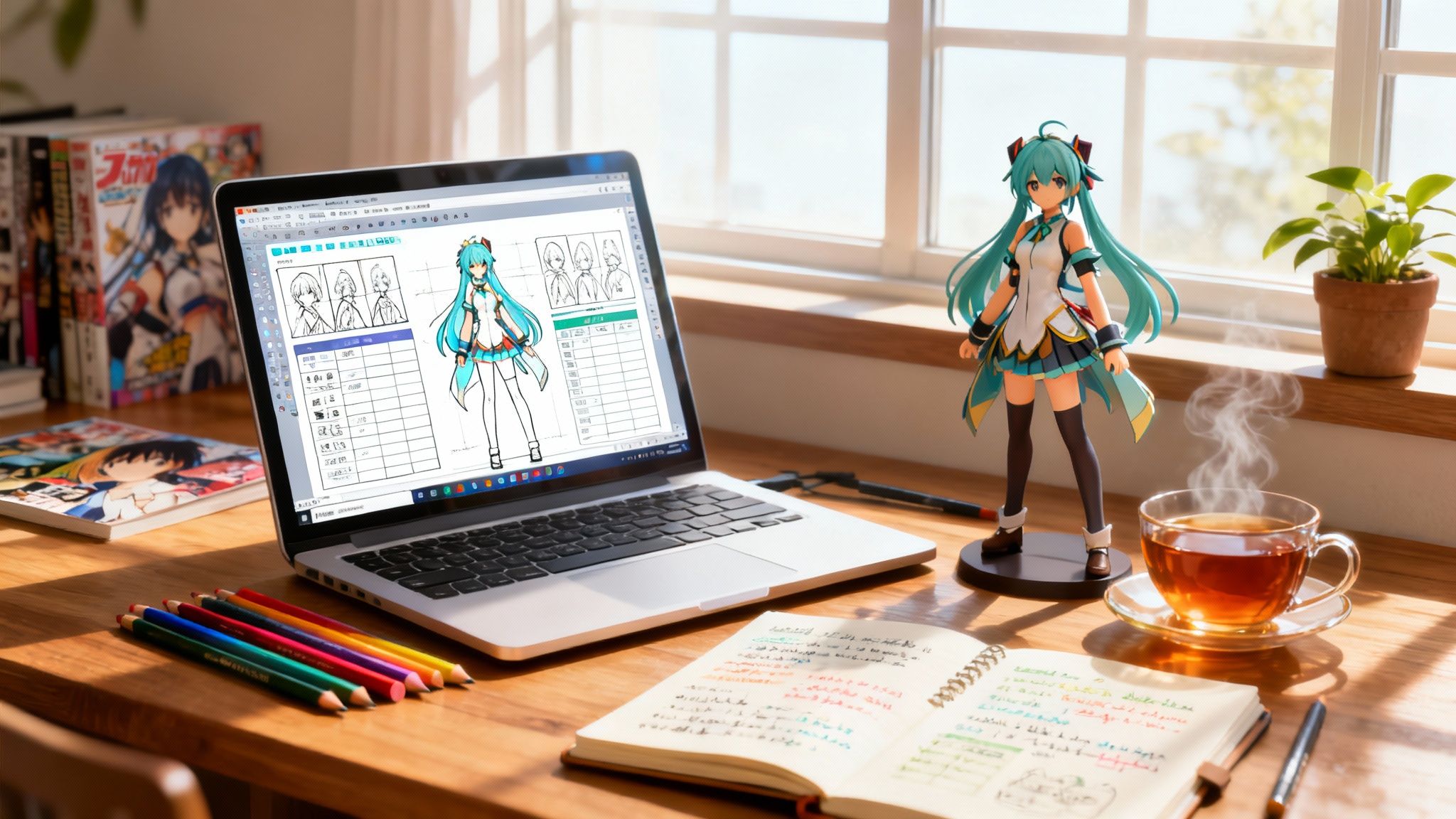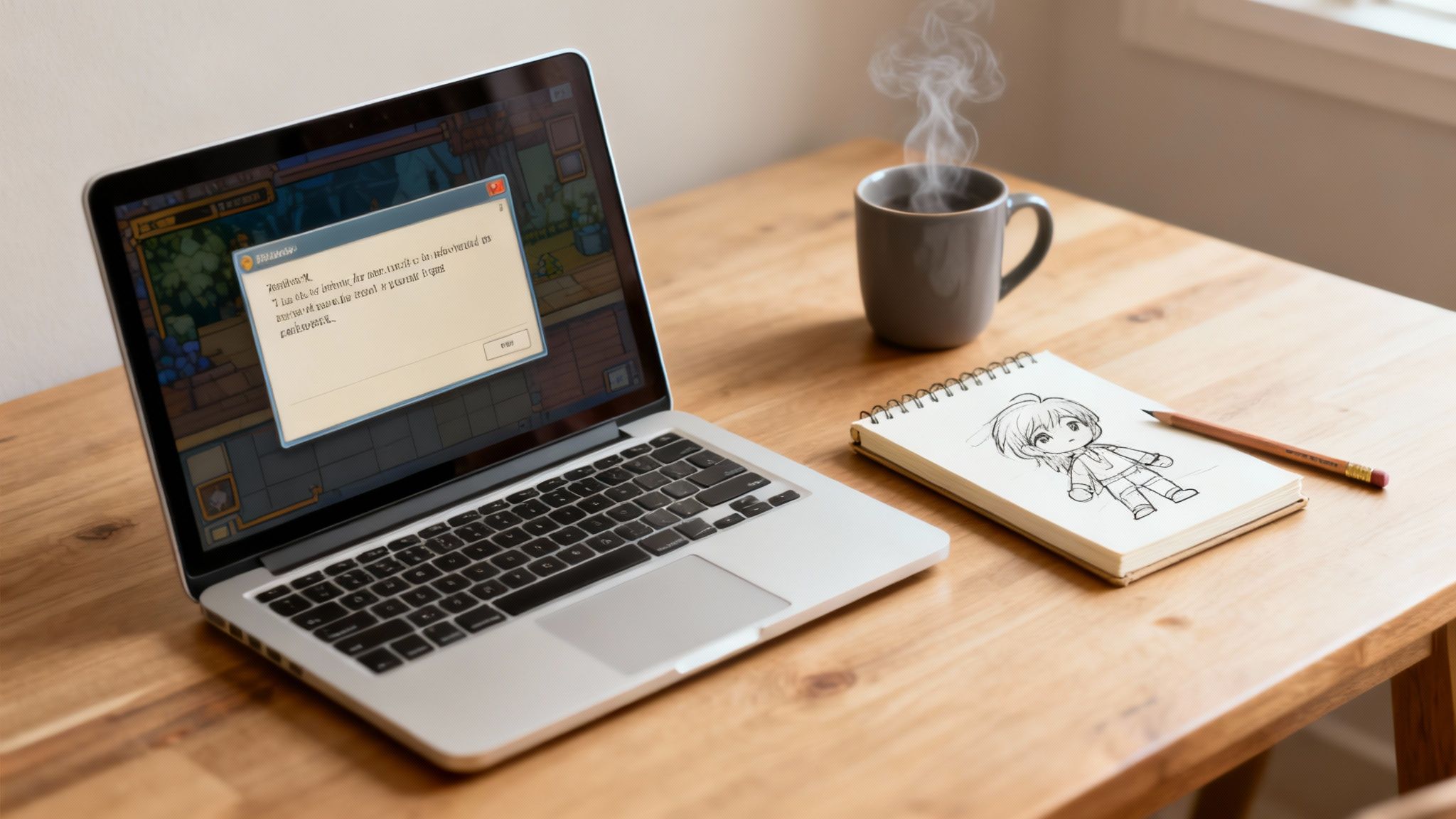Create Your Own AI Girlfriend 😈
Chat with AI Luvr's today or make your own! Receive images, audio messages, and much more! 🔥
4.5 stars

At its heart, an anime role player is a storyteller. They're someone who steps into the shoes of a character they've created, bringing them to life in a shared, fictional story inspired by the vibrant worlds of anime. It's a unique blend of creative writing and fandom, where you and other players work together to build a narrative through your characters' actions, thoughts, and dialogue.
Embark on Your Anime Role-Playing Journey
So, you're curious about this world of collaborative storytelling. Forget rigid rulebooks and think of it more like improv theater, but in writing. You and your partners are building a story together, one post at a time, reacting and adding to the narrative as you go.
This guide is your starting point. We're going to dive into everything from crafting your very first character to navigating the unwritten rules of online communities. The goal here is simple: to spark your imagination and show you just how creative and welcoming this space can be.
The Growing World of Anime Fandom
The love for anime has exploded into a massive global community. Just a quick glance at the different art styles and genres shows you the sheer diversity that captivates millions.

It’s this incredible visual and thematic variety that gives an anime role player such a rich playground. The inspiration for characters, worlds, and wild plotlines is practically endless. This isn't just a niche hobby anymore; the numbers prove it.
The global anime market hit a value of around $32.15 billion in 2025 and is on track to more than double, reaching an estimated $72.35 billion by 2035. With roughly 70% of anime consumption now happening online, digital spaces have become the new town square for fans to gather, especially for role-playing groups. You can explore the anime market's impressive growth to see the full picture.
Why People Love Anime Role-Playing
What's the big deal? Why do so many people get hooked? It really comes down to a perfect mix of creative expression and genuine human connection.
For an anime role player, the draw is the chance to:
- Unleash Your Creativity: Got an idea for a stoic samurai in a feudal world? Or maybe a magical girl trying to survive high school in modern-day Tokyo? You can build and become any character you can dream up.
- Tell Stories Together: Writing a novel can be a lonely process. Role-playing is the opposite. The story is built with other people, which means you'll constantly be surprised by unexpected plot twists and organic character growth.
- Find Your People: At its core, role-playing is social. It’s a fantastic way to bond with people who are just as passionate about anime and storytelling as you are.
So, What Exactly Is Anime RP?
Ever wonder what an anime role player actually does? At its heart, anime roleplaying is really just collaborative storytelling.
Picture this: you and a few friends decide to write an anime episode together. But instead of one person writing the whole script, each of you takes on the role of a single character. You dictate what they say, what they do, and how they react to the unfolding chaos around them. That's the core of it.
This shared creative spark is what makes every story feel alive and unpredictable. You might kick things off with a simple premise, but the story will inevitably twist and turn in ways you never saw coming, all thanks to the choices everyone makes. The real magic happens when you get inside your character's head and start acting as they would, building a narrative that no one person could have ever imagined on their own.
Getting In-Character vs. Staying Out-of-Character
One of the very first things you'll learn is how to draw a line in the sand between yourself and the character you're playing. This is the bedrock of good role-play etiquette. Think of it like an actor on a movie set—they're completely in character when the cameras are rolling, but as soon as the director yells "cut," they're back to being themselves.
- In-Character (IC): This is "camera's rolling" time. Everything you type is from your character's point of view. Their dialogue, their inner thoughts, their actions—it's all them.
- Out-of-Character (OOC): This is you, the writer, talking. OOC is for all the behind-the-scenes stuff: planning the next plot twist with your partners, asking questions, or just chatting. We usually fence it off with parentheses, like
((Hey, want them to run into each other at the ramen shop?))to keep it from bleeding into the story.
Keeping these two separate is crucial. It preserves the immersion and keeps the story flowing smoothly. A great anime role player instinctively knows when to be the character and when to be the writer, making them an amazing partner to build a story with.
The Bottom Line: Role-playing is a delicate dance. You're part author, part actor, and part collaborator, all at once. Learning to navigate that line between IC and OOC is your first big step toward mastering the craft.
The Different Flavors of Role-Playing
Not all RP is created equal. The style you use often comes down to the platform you're on and what you and your partners prefer. Each format offers a completely different rhythm and level of detail.
The two big styles you'll run into are live sessions and play-by-post. Live sessions, which are huge on platforms like Discord, feel like instant messaging. They're fast, snappy, and perfect for action-packed scenes where quick thinking and rapid-fire replies keep the energy high.
Then you have play-by-post (PBP), which is the go-to for forums and dedicated writing sites. This is the slower, more literary cousin. It gives every anime role player the space to write out beautiful, multi-paragraph posts. If you love deep character dives and detailed world-building, PBP is your jam, since you can take hours or even days to perfect your next entry. It all comes down to what you're in the mood for: the thrill of spontaneous improv or the satisfaction of crafting a deliberate, thoughtful narrative.
Crafting Your Unforgettable Anime Character
Think of your character as your personal avatar in the story. They're the lens through which you see everything unfold, and honestly, building one is so much more than just slapping on a cool name and a slick design. It’s about breathing life into a personality, someone with the spark to actually drive the plot forward. The best characters feel real—they have goals, secrets, and flaws that make them impossible to forget.

This is where you get to be an architect of a fictional soul. The most compelling characters are often a mix of familiar anime tropes and totally unexpected quirks. What really makes them tick beyond the obvious "save the world" stuff? Maybe they’re desperate for acceptance, hungry for revenge, or just trying to find a place where they finally feel like they belong. These deep-seated desires are the real engine of your story.
Building Your Character From the Ground Up
Before you even think about writing that first line of dialogue, spend some time getting to know who your character is at their core. A solid foundation is what makes their actions feel authentic and believable, even when the story throws a crazy plot twist their way.
You can start by asking yourself some of the big questions:
- What is their core motivation? What's the one thing that gets them out of bed in the morning and fuels their biggest decisions?
- What are they afraid of? Flaws and fears make a character relatable. A hero who is secretly terrified of failure is infinitely more interesting than one who has no fear at all.
- What is a secret they keep from everyone? This is pure gold for creating internal conflict and can set up some incredible plot developments down the road.
A truly memorable anime role player understands that a character's weaknesses are just as important as their strengths. Perfect characters are boring; flawed characters are fascinating and feel human.
This isn’t about just filling out a form. It’s a process of discovery. Sometimes, a character will completely surprise you, growing in ways you never could have planned. That kind of organic development is one of the most rewarding parts of roleplaying. And if you're a visual person, you can even use an AI character builder to create stunning visuals to bring them to life before you start.
Original Characters Versus Canon Characters
Sooner or later, every role player hits a crossroads: do you invent a character from scratch, or do you step into the shoes of someone who already exists in an anime series? There's no right answer, and both paths offer their own unique challenges and creative thrills.
To make it clearer, let's break down the differences.
Original Character vs. Canon Character Comparison
| Aspect | Original Character (OC) | Canon Character (CC) |
|---|---|---|
| Creative Freedom | Complete. You define their history, personality, and abilities from the ground up. | Limited. You must stay true to the established personality and backstory. |
| Effort Required | High. Requires a good deal of world-building and character development on your part. | Moderate. The foundation is built, but it requires a deep study of the character. |
| Community Fit | Can be tailored to any story, but you might need to introduce them to the group. | Instantly recognizable and easy for others to interact with in fandom-specific RPs. |
Opting for an Original Character (OC) is like being handed a completely blank canvas. The story is yours to shape, which offers an incredible amount of freedom. The flip side is that it’s on you to make them interesting and find a way for them to fit naturally into the world.
On the other hand, playing a Canon Character (CC)—like a hero or villain from your favorite show—is more of an interpretive art. The challenge is to embody them so authentically that your reactions to new situations feel exactly like something they would do. It’s a fantastic way to sharpen your character analysis skills and feels amazing when you nail it.
Ultimately, the best choice is the one that sparks your creativity the most.
Finding Your Community and Role-Play Platform
You’ve got a compelling character ready to step into the spotlight. Now, where do they go? The next, and arguably most exciting, step is finding a stage to bring them to life. The online world is overflowing with vibrant communities, each with its own unique flavor of role-play. Knowing where to look is what separates a good story from a truly unforgettable one.
These digital hubs are where adventures begin and, more often than not, where lasting friendships are made. You’ll find everything from chaotic, fast-paced combat scenarios to thoughtful, slow-burn narratives that might unfold over months or even years. The right community isn’t just a place to write; it’s a collaborative space where you can really grow as a storyteller.
And this world is bigger than ever. The anime fandom's explosive growth is undeniable—the U.S. market alone hit $10.3 billion in 2024 and is projected to skyrocket to $20.5 billion by 2032. This passion is on full display in the online spaces where role-players gather, building shared worlds and contributing to a thriving digital culture.
Where to Find Your Next Adventure
Jumping in can feel a little overwhelming with so many options, but most communities congregate on a handful of key platforms. Each one caters to a slightly different style of play, so it's worth poking around to see what feels right for you.
- Discord Servers: This is the undisputed king of live, rapid-fire role-playing. Servers are usually organized by a specific anime, genre, or original world, with separate channels for in-character action and out-of-character chatter.
- Forums and Message Boards: The classic home of play-by-post (PBP) role-playing. If you like to take your time and craft longer, more literary posts, this is your jam. The pace is much more relaxed.
- Reddit: Subreddits like r/Roleplay are massive bulletin boards for finding partners and groups. People post detailed ads outlining their story ideas, themes, and what they're looking for in a writing partner.
Here’s a look at the Discord interface, which has become the go-to for many real-time role-players.

The platform’s channel structure is perfect for keeping the story clean. You can have your in-character scenes in one place and your memes and plotting in another, which helps everyone stay immersed.
Deciphering Role-Play Advertisements
As you browse for a group, you’ll be reading lots of advertisements that are basically movie trailers for a story. Learning to read between the lines is the key to finding a great fit.
Pro Tip: Look for ads that are clear about expectations. Things like posting frequency, literacy level (e.g., "literate" or "multi-para"), and major themes are huge. A well-written, detailed ad is almost always a sign of a well-organized and committed group.
Pay attention to the little things. Does the plot require an original character, or are they looking for people to play canon characters from a specific series? Do they list any "deal-breakers" or content warnings? Figuring this out upfront saves everyone a headache and ensures you land in a community where you can feel comfortable and creatively fulfilled.
And if you want to practice solo or flesh out your character’s personality, trying an AI character chat feature can be an amazing tool. It’s a low-pressure way to get a feel for your character's voice before you jump into a scene with other writers.
Mastering the Unwritten Rules of Role-Play Etiquette
The best collaborative stories are built on a bedrock of mutual respect. Like any team sport, anime role-playing has its own set of unspoken rules that keep things fun and fair for everyone. Getting a handle on this etiquette is what separates a decent writer from a truly great partner.It all boils down to one simple idea: your character is the only one you get to control. The story is a shared world, not a stage for your character's solo act. When you respect your partner's creative freedom, you build the kind of trust that lets you create something incredible together. Every seasoned role-player knows this in their bones.
Avoiding Common Role-Play Pitfalls
Two of the biggest tripwires in the world of role-playing are ‘god-modding’ and ‘meta-gaming’. Pulling one of these moves is the fastest way to kill the vibe and frustrate your partners, so let's break down what they are and why they're such a big deal.
God-modding is when you take control of someone else's character without their permission. This means writing their actions, deciding their feelings, or even declaring that your attack against them was a success. It completely snatches their agency away.
- Don't do this: "Kenji swung his sword, striking Akira squarely in the chest and sending him flying back into the wall, defeated."
- Do this instead: "Kenji swung his sword, aiming for Akira’s chest in a powerful downward slash."
See the difference? The second version gives the other player the power to decide what happens next. Does Akira dodge? Does he try to block? Does he get hit? That choice belongs to them, and them alone.
Meta-gaming, on the other hand, is when you use information that you, the writer, know, but your character doesn't. This is classic out-of-character (OOC) knowledge creeping into the story. If your partner tells you OOC that their character has a secret fear of spiders, your character can't just suddenly start using spiders against them unless they discovered that fear within the story itself.
Respecting creative boundaries is non-negotiable. An anime role player who avoids god-modding and meta-gaming shows they are a thoughtful and reliable partner, making them someone others are genuinely excited to write with.
Constructive Communication and Boundaries
Sooner or later, you and your partner will hit a creative snag. It happens. How you navigate these moments is what really defines your partnership. The solution is always open, honest, and respectful communication.
If a plot twist makes you uncomfortable or you feel the story is veering off course, say something! A quick OOC message can clear things up before they become a real problem.
It's also a great idea to talk about boundaries and preferences before you even write the first post. Discussing themes you want to explore (or avoid) and character dynamics ahead of time prevents so many headaches down the line. This groundwork makes sure everyone feels safe and comfortable, which is exactly the kind of environment where creativity can flourish.
Elevating Your Storytelling and Writing Skills

There comes a point in every anime roleplayer's journey where you want to move beyond just participating and become a true architect of the story. It’s a natural step. You stop simply reacting to what others write and start actively shaping the narrative with prose that makes your shared world breathe.
This is where you master the real art of roleplaying: description, emotion, and plot.
Truly memorable posts paint a picture in the reader's mind. You’re not just stating what happens; you're immersing your partners in the scene. Think of the difference between writing "she was sad" versus describing "the tremor in her voice as she forced a smile, her gaze fixed on a distant, unseen point." One is a fact. The other is a moment.
Painting a Vivid Picture with Words
To make your writing really connect, you need to engage the senses. A scene isn't just about what a character sees. What about the smell of rain on hot asphalt after a storm? The distant wail of a city siren cutting through the night? Or the rough, worn texture of a hero's coat?
These little details are what ground a story and make it feel real. A few well-chosen sensory details can do more heavy lifting than an entire paragraph of flat explanation.
- Show, Don't Tell: This is the golden rule for a reason. Instead of telling us a character is angry, show us their knuckles turning white as they grip the edge of a table.
- Use Strong Verbs: Ditch the weak, passive verbs. Your character doesn't just "walk" across a room; they "stride" with purpose, "stumble" in exhaustion, or "creep" in with silent dread. The verb choice changes everything.
- Create Atmosphere: Pay attention to the environment. Is the fluorescent lighting harsh and clinical, or is the room lit by the soft, warm glow of a fireplace? Is the air heavy with unspoken tension or buzzing with excitement?
When you start weaving these elements into your posts, they become more cinematic and magnetic, pulling your partners deeper into the world you're all building together.
The best writers make you forget you are reading. They craft scenes so vivid that you feel like you are standing right there beside the characters, experiencing the story firsthand.
Building Powerful Character Arcs
Let's be honest: a static character is a boring character. The stories that stick with us are the ones where characters change, grow, and react to the conflicts and relationships they face. This evolution is the character arc, and it’s the heart of any story with real emotional weight.
As a roleplayer, you get to be the guide for your character's journey. Think about where they start. Who are they at the beginning? Then, think about where you'd like them to end up. Maybe they overcome a crippling fear, learn to trust after a devastating betrayal, or let go of a long-held grudge.
The engine that drives this change is meaningful conflict. You have to put your character in difficult situations that challenge their core beliefs and force them to make impossible choices. It’s in those moments of struggle that real growth happens. That’s how a character goes from a simple sketch to a fully realized person with a story worth telling.
Still Have Questions? Let's Clear Things Up.
Even with the basics covered, you might still have a few lingering questions. That's perfectly normal. Getting these sorted out is the last step before you can confidently dive into your first role-play.
Let's tackle some of the most common concerns I hear from newcomers.
"Do I Need To Be an Amazing Writer to Do This?"
Not at all. Let me be clear: this is not a creative writing competition. While sharp writing skills are always a plus, the real core of anime role-playing is imagination and a love for storytelling.
Every single anime role player out there started as a beginner. The best communities are built on being welcoming and encouraging, no matter if you're writing your first paragraph or your thousandth. The goal is to have fun and create something cool together. Your writing will get better over time, I promise. Just focus on the story.
"What Kind of Time Commitment Are We Talking About?"
This is completely up to you and the group you join. It can be as demanding or as casual as you want it to be. For instance, some role-plays on Discord are "live" events, where everyone is online at the same time for a few hours of rapid-fire posts.
On the other hand, a ton of games are "play-by-post" on forums or dedicated servers. These are much more relaxed. You might post once a day, or even just a couple of times a week. The golden rule is to always ask about activity expectations before you jump in.
"Is It Safe to Role-Play Online?"
It absolutely can be, as long as you use the same common sense you'd use anywhere else online. The most important thing is to guard your personal information. Never give out your real name, address, or other sensitive details to strangers.
My advice?
- Stick to established communities with active moderators and clear rules.
- Spend some time observing a new group before you get deeply involved.
- Keep your initial interactions in public channels.
Your safety always, always comes first. Find a space where you feel comfortable and respected.
Ready to bring your own anime-inspired characters to life? At Luvr AI, you can create, chat, and explore rich narratives with advanced AI companions. Start your storytelling journey today!



